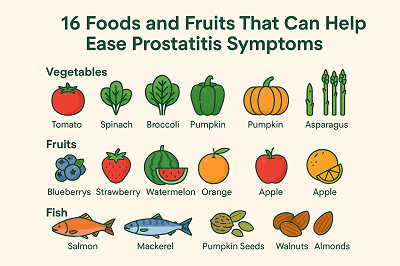16 Foods and Fruits That Can Help Ease Prostatitis Symptoms
Prostatitis can be a real nuisance—frequent urination, urgency, burning sensations. These symptoms often leave men feeling restless and drained, seriously affecting daily life. While sticking to proper medical treatment is key, your diet can also play a powerful supporting role.
Some foods are rich in natural anti-inflammatory and antioxidant compounds, as well as essential nutrients that may help reduce inflammation and ease discomfort. Here’s a list of 16 foods and fruits that are especially helpful for men dealing with prostatitis—small dietary changes that can make a big difference.

1. Choose the Right Foods: Let Diet Be Your Anti-Inflammatory Ally

(1) Vegetables: Nature's Detox and Anti-Inflammatory Powerhouses
Tomatoes: Lycopene, the red pigment in tomatoes, is a superstar antioxidant. It helps neutralize free radicals and reduce inflammation in the prostate, easing symptoms like pain and urinary urgency. Cooked tomatoes are even easier to absorb.
Spinach: Packed with vitamins C and E, as well as magnesium, spinach helps your body build a strong antioxidant defense. This can help reduce inflammation and improve discomfort.
Broccoli: Contains glucosinolates—compounds known for their anti-inflammatory and anti-cancer properties. They support prostate health and help reduce irritation, pain, and urinary symptoms.
Pumpkin: Loaded with zinc, which is essential for maintaining prostate function and immunity. Also rich in vitamin A to support a healthy urinary tract lining. Together, they may help reduce frequent urination.
Asparagus: High in dietary fiber, asparagus promotes gut health and helps lower systemic inflammation. It also contains vitamin K, which supports normal urinary function.
(2) Fruits: Antioxidant Boosters & Natural Soothers
Blueberries: Their deep blue color comes from anthocyanins—potent antioxidants that protect prostate cells from damage, reduce inflammation, and help with pain. Even frozen blueberries retain their nutritional value.
Strawberries: Also rich in anthocyanins. They're low in purines, which means they won't overburden the body and may even help flush out metabolic waste—great for reducing pain.
Watermelon: Its high water content helps increase urine output and flush the urinary tract, lowering bacterial growth. It also contains lycopene for added anti-inflammatory benefits.
Oranges: A great source of vitamin C and carotenoids, oranges help strengthen the immune system and ease inflammation-related discomfort. They also offer trace elements that support recovery.
Apples: Contain zinc, which is vital for maintaining healthy prostate secretions and relieving frequent urination.
(3) Fish: Rich in Healthy Fats That Fight Inflammation
Salmon: A top source of omega-3 fatty acids, which have well-known anti-inflammatory effects. These fats can help regulate the body’s inflammatory response and reduce prostate swelling.
Mackerel: Another excellent source of omega-3s that supports prostate health and reduces inflammation.
Trout: Similar to salmon, it provides both omega-3s and vitamin D—a great combo for anti-inflammatory support.
(4) Nuts & Seeds: Small but Mighty Nutrient Bombs
Walnuts: Provide both zinc and vitamin E—two nutrients that work together to protect the prostate from oxidative stress and inflammation.
Pumpkin Seeds: Known as the "guardian of men's health," these are packed with zinc and have a mild diuretic effect that helps with urinary symptoms like urgency and frequency.
Almonds: Rich in vitamin E and magnesium. Vitamin E helps protect cell membranes, while magnesium helps relax smooth muscles (including those in the urinary tract), reducing painful spasms.
2. Easy Meal Ideas: Delicious and Prostate-Friendly
Incorporating these foods into your daily routine is simpler than you think. Try these easy meal combos:
Breakfast Boost: Plain yogurt or milk + fresh blueberries + strawberries + a few walnuts or almonds.
Healthy Snack: A handful of mixed nuts (walnuts, pumpkin seeds, almonds) + an apple.
Wholesome Lunch: Lightly seared salmon or mackerel + garlic stir-fried broccoli + brown rice. Or try scrambled eggs with lots of tomato and steamed pumpkin on the side.
Refreshing Dinner: Chilled tofu with spinach + a broccoli-asparagus salad. Or stir-fried tomato, broccoli, and chicken breast.
Hydration Helpers: Snack on chopped watermelon and orange slices, or make fresh juices from apples, pears, and carrots. Raw tomato or tomato soup is another great addition.
3. A Few Important Tips to Keep in Mind
Food Supports, but Doesn't Replace Treatment: Remember, diet is a great helper—but it’s not a substitute for medical treatment. Always follow your doctor’s advice. Common herbal treatments include:
- Diuretic and Anti-inflammatory Pill: Clears heat and toxins, promotes urination.
- Taohong Siwu Decoction: Improves blood circulation and eases pain.
- Jinkui Shenqi Pill: Supports kidney function and addresses fatigue or sexual issues.
Avoid Trigger Foods:
- Spicy foods: Chili, peppercorns, and mustard can irritate the prostate and urinary tract.
- Alcohol: A major enemy for prostatitis—it dilates blood vessels and worsens swelling.
- Coffee and strong tea: The caffeine can irritate the bladder and increase urgency and frequency.
Everyone's Different: Pay attention to how your body responds. If a certain food worsens your symptoms, stop eating it and monitor the change.
Don't Hesitate to Seek Help: If symptoms persist or worsen despite a healthy diet and standard treatment, see your doctor. You may need a treatment adjustment.
Final Thoughts
Eating well is a powerful step in your journey to recovery. By adding more anti-inflammatory, antioxidant-rich foods and key nutrients into your meals, you’ll be giving your prostate the support it needs—easing those annoying symptoms and improving your quality of life.



